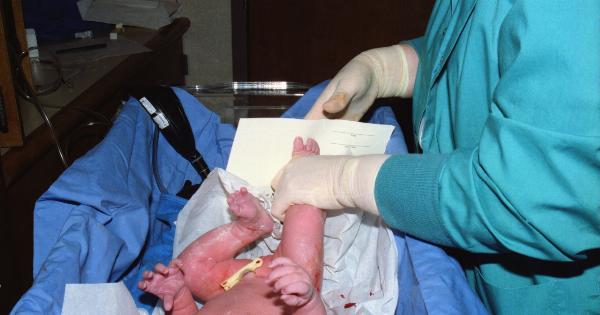Caesarean section (C-section) is a surgical procedure used to deliver a baby through incisions in the mother’s abdomen and uterus.
While it is a potentially life-saving procedure for both the mother and the baby, there has been growing concern about the impact of C-sections on the infant’s gut flora. Gut flora, also known as gut microbiota, refers to the complex community of microorganisms that reside in the digestive tract.
The role of gut flora in infant health
The gut flora plays a crucial role in infant health. It helps in the digestion and absorption of nutrients, helps train the immune system, aids in the metabolism of drugs and toxins, and protects against harmful pathogens.
The colonization of the gut begins at birth and is influenced by various factors, including the mode of delivery.
Differences in gut flora between vaginal and C-section deliveries
Studies have shown that gut flora in infants born via vaginal delivery differ significantly from those born via C-section.
The vaginal canal is rich in beneficial bacteria, such as Lactobacillus and Bifidobacterium, which are transferred to the baby during a vaginal birth. These bacteria help establish a healthy gut flora in the infant.
On the other hand, infants born via C-section are initially colonized by bacteria from the hospital environment and the skin of healthcare providers, which may not provide the same beneficial effects.
The short-term effects on infant health
Research suggests that infants born via C-section have an altered gut flora composition in the early days of life compared to vaginally delivered infants.
This alteration may lead to an increased risk of developing certain health conditions, such as allergies, asthma, obesity, and autoimmune diseases. The disruption of the normal gut flora can also affect the development of the immune system and increase susceptibility to infections.
Long-term implications on health
Several studies have investigated the long-term effects of C-section delivery on gut flora and its implications on health.
It has been suggested that alterations in gut flora during infancy may have long-lasting effects on the development of chronic diseases later in life.
The gut microbiota is known to play a role in the regulation of metabolism, immune function, and brain development, and disturbances in its composition may contribute to the development of conditions such as obesity, diabetes, and mental health disorders.
Factors influencing the impact of C-section delivery on gut flora
The impact of C-section delivery on gut flora is not solely determined by the surgical procedure itself.
Several other factors can influence the colonization of the infant’s gut, including maternal factors, such as the mother’s diet, antibiotic use during pregnancy, and breastfeeding. Additionally, environmental factors, like the use of antibiotics in the neonatal period and the mode of infant feeding (breastfeeding vs. formula feeding), can also affect the establishment of a healthy gut flora.
Strategies to mitigate the impact on gut flora
Recognizing the potential impact of C-section delivery on infant gut flora, researchers and healthcare providers have been exploring strategies to mitigate these effects.
One approach is vaginal seeding, in which the baby is exposed to the mother’s vaginal fluids immediately after birth via C-section. This practice aims to mimic the natural transfer of beneficial bacteria during a vaginal birth. However, the long-term safety and effectiveness of vaginal seeding are still uncertain, and it is not widely recommended as a routine practice.
Another strategy involves the use of probiotics, which are live microorganisms that can confer health benefits when consumed in adequate amounts.
Probiotics have been shown to positively influence the composition of gut flora and may help mitigate the dysbiosis caused by C-section delivery. However, further research is needed to establish the optimal probiotic strains, dosages, and timing for maximum benefits.
The importance of informed decision-making
While C-sections are sometimes necessary for the health and well-being of both the mother and the baby, it is important for expectant parents to be informed about the potential impact on infant gut flora.
Open discussions with healthcare providers about the risks and benefits of different birthing options can help parents make informed decisions. Additionally, further research in this area is crucial to better understand the long-term implications of altered gut flora and develop strategies to promote and restore a healthy gut microbiota in infants born via C-section.






























